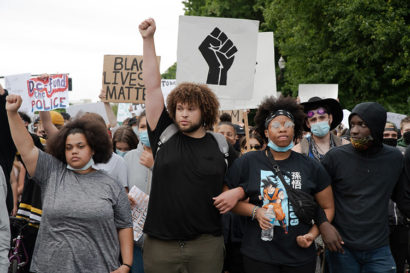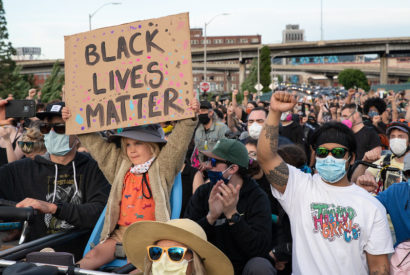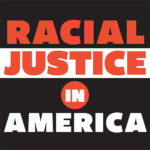Savala Trepczynski on Breonna Taylor and the elusive nature of racial justice
The director of UC Berkeley's social justice center reflects on the Taylor case and its parallels to the death of her great-great-grandmother
September 25, 2020
When Savala Trepczynski, the director of the social justice center at UC Berkeley, first heard the decision in the Breonna Taylor case — that only one of three police officers involved in Taylor’s killing in March was indicted on charges of reckless endangerment — a familiar feeling sank in.
“The fact of the charge is upsetting, disappointing, angering — all of those things,” said Trepczynski. “And so, I felt the exhaustion of forbearance and abiding and feeling again and again that even when you get justice, it’s kind of a half step. It’s a measure of justice. It’s not the whole thing.”
And she was reminded of a murder so similar to Taylor’s that happened in her own family — to her great-great-grandmother.

A protestor at a march for racial justice in Atlanta, Georgia, holds a sign of Breonna Taylor, a 26-year-old Black woman who was killed by Louisville police on March 13, 2020, during a botched drug raid. (Photo by Maria Oswalt via Unsplash)
Read a transcript of Fiat Vox episode #65: “Savala Trepczynski on Breonna Taylor and the elusive nature of racial justice”:
Savala Trepczynski: You know, Breonna Taylor was a Black woman and we live in a world of hierarchy and, sort of, the lower the identities that make you up are, the lower they rank in this society, the harder it’s going to be to get your needs met in life, or in her case, death.
On Wednesday, Sept. 23, a Kentucky grand jury indicted Brett Hankison, one of three white Louisville police officers involved in the killing of Breonna Taylor, a 26-year-old Black medical worker. Hankison was charged with wanton endangerment — a low-level felony — for blindly shooting 10 rounds into her apartment during a drug raid in March. (No drugs or money related to drugs were found during the raid.) The other two officers who also fired shots during the botched raid were not indicted.
[Music: “Waypost” by Blue Dot Sessions]
It’s one of several police killings that has fueled ongoing demonstrations across the country since the end of May.
This is Fiat Vox, a Berkeley News podcast from the Office of Communications and Public Affairs at UC Berkeley. I’m Anne Brice.

Savala Trepczynski is the director of the Thelton E. Henderson Center at the UC Berkeley School of Law. (Photo by Savala Trepczynski)
We spoke with Savala Trepczynski, director of the Thelton E. Henderson Center at the UC Berkeley School of Law, about the decision in the Breonna Taylor case, the elusive nature of racial justice and how the details surrounding Taylor’s murder are all too familiar.
[Music fades down]
Savala Trepczynski: Sitting at my laptop, I saw the headlines, and I just felt my body sort of release and exhale. It was a reminder that we experience these questions of injustice and of belonging and of safety physically. You know, we experience them in our bodies. I felt just a bit of release, and realized how tightly I’d been, sort of, clenched against the possibility of there being no kind of atonement or accountability.
And then, that release I felt physically kind of turned into a slump as it set in that the charge is a pretty light one — only one officer was charged — and that familiar feeling of too little, too late, of not really getting what you need, set in.
As an attorney, she says she wasn’t surprised by the decision, given that the system in place in this country tends to favor police and protect them from accountability.
Savala Trepczynski: As a person, though, the fact of the charge is upsetting, disappointing, angering — all of those things. And so, I felt the exhaustion of forbearance and abiding and feeling again and again that even when you get justice, it’s kind of a half step. It’s a measure of justice. It’s not the whole thing.
[Music: “Vdet” by Blue Dot Sessions]
Trepczynski says that, after Taylor’s killing, she began to wrestle with the sense that so many people of color do — that the more things change, the more they stay the same. And she was reminded of a murder so similar to Taylor’s that happened in her own family — to her great-great-grandmother.
Savala Trepczynski: I was taking walks in my neighborhood to try and decompress at the end of the Zoom workday and just found myself, over and over and over, thinking about the ways that what happened to Breonna Taylor, you know, being killed in her home by law enforcement as a Black woman, mirrored what happened hundreds of years ago to my great-great-grandmother. Her name was Laura.
We’re not sure exactly how she got to Texas, except that her husband’s work was there. She lived there with her husband and her children. And she was pregnant.
One day, a crew of Texas Rangers approached her house — essentially a crew of law enforcement. They suspected, incorrectly, that she was harboring a Black man who was suspected of committing a crime. We don’t know anything about the crime he was suspected of committing or whether he did it or not. But he was not in the house. They thought that he was, and he was not.
They asked to enter the house. You know, it may have been more of a demand than a request. We don’t know, but one can imagine. And she said, ‘No,’ she did not want them to come into the house. Her children were there. She was alone because her husband was at work. And she was shot upon refusing them entry. One of the rangers, or perhaps more of them, shot her through the screen door and killed her and the child that she was pregnant with.
I think about what it must have been like for her and what she must have felt, standing on the porch with her screen door. I’ve sort of tried on a lot of different emotional states for her, kind of as a way of humanizing her myself and as a way of creating a counter-narrative to this relentless story of Black sadness and Black pain. I imagine her, you know, with her chin up, being strong and feeling courageous in the moment, as often as I imagine her being terrified. We’ll never know. We’ll never know, we’ll never know.
[Music fades down]
She says that while there are practical ways to address the systems that we have that could help prevent this kind of tragedy from happening again, like changing how we fund and resource the police, it’s not going to be enough. The real work, she says, will take changing society’s underlying belief that Black life is inferior — a belief that has persisted for centuries.

Trepczynski says that in order for real change to happen, the basic underlying belief that Black life is inferior — a belief that has animated our society’s institutions for centuries — needs to change. “I hope we’re heading to that point,” she says. “I really do.” (Photo by Matthew Roth via Flickr)
Savala Trepczynski: The real work, I think, happens on a deeper level. It happens in the realm of morals and beliefs and ethics because institutions, they exist as a reflection of what people believe. The whole point of institutions and systems is to make the beliefs that a society has operational. So, you can change an institution, but if you don’t change the belief that animates the institution, that sort of gave birth to it, that sustains it, then another institution will pop up. It might look a little different, but it will still reflect and carry out those beliefs.
[Music: “Di Breun” by Blue Dot Sessions]
If you think about chattel slavery in this country and the hundreds of years of that system, the basic underlying belief — there were many — but the basic underlying belief was that Black life is inferior, and that it can and should be used and controlled, as if it were unequal to white life. That’s the basic underlying belief.
The institution of chattel slavery eventually becomes untenable, and we get rid of it. But the belief doesn’t really change deeply enough or broadly enough. And so, following the end of the institution of chattel slavery, you have the popping up of the Black codes and convict leasing and Jim Crow. New systems, new institutions that reflect, fundamentally, the same beliefs that animated the old one.
Time marches on, and then, Jim Crow and convict leasing and the Black codes become untenable, and we dismantle them, they disappear. But the belief doesn’t change — that underlying belief in the inferiority of Black life does not change.
And so, new institutions pop up. And what do they do? Well, they don’t do exactly what the old ones did, because they look a little different, but they still respond to and reflect that underlying belief. And so, we get the war on drugs and incarceration rates skyrocketing and the criminalization of poverty and the carceral state exploding in ways that target Black and brown communities.
Right now, in this moment, we’re looking at these institutions, this most recent set of institutions, and saying, ‘This has got to change. These systems don’t work.’ And we may well be on the road to dismantling them.
However, if the underlying belief doesn’t change, there will simply be a new institution that follows the sort of carceral state that we have right now, but reflects the same beliefs around the value of Black life. Which is why I say, you know, you need both. You need the targeted, practical change for this to end, and you need the, I think, more difficult and more long-term, more painful, uncomfortable change that happens on the level of belief and morality.
And when we have a surge in both of those places for a sustained amount of time, then I think you start to approach a point where transformation is possible, where transformative change is possible. And I hope, I hope that we’re heading to that point. I really do.
[Music fades down]
After the decision in Taylor’s case was announced Wednesday, demonstrators poured into downtown Louisville and into other cities across the nation to protest police brutality and continue their fight for racial justice.

A young protester holds a Black Lives Matter sign at a march in Portland, Oregon, in June 2020. Trepczynski says it’s heartening to see more white people involved in the protests, and that in order for our society to evolve, it’s essential for white people to be part of the fight. (Protest photo by Matthew Roth via Flickr)
Trepczynski says it’s been encouraging to see more white people involved in the protests, and that in order for our society to evolve, it’s essential for white people to be part of the fight.
That’s a reason to celebrate because, you know, Black and brown people have been protesting our mistreatment, our torture, our murder, our trafficking, for centuries, since it began. So, we have always been doing this work. White people have not always been doing it alongside us and with us, so to see more white people engaged is fantastic. And it’s absolutely necessary if we want to evolve.
At the social justice center, Trepczynski works with law students, exploring how they understand race and racism, and how we can try to release ourselves from the grip of racism and racial hierarchy in the U.S.
Savala Trepczynski: And when I say, ‘how we try to do that,’ I do mean all people. I mean Black people, white people, everybody in between, because we’re all impacted by it. The impact is different for people who are Black and brown than for people who are white. But we’re all impacted by it. So, there’s work for everyone to do, and there’s all kinds of work to do. This is kind of an all-hands-on-deck moment, I think. And it’s an all-hands-on-deck project, right? This moment will fade, but we’ll still need all hands on deck once the news cycle has moved on.
[Music: “Taoudella” by Blue Dot Sessions]
And she says, we’re all capable of doing the work — of rising to the occasion and fighting for what we believe in, learning as we go.
Savala Trepczynski: Heroes are just people doing heroic things, right? There’s not something extra-human or more special about them than the rest of us. We all have that capacity, if we’re in a moment that calls for it, if we can kind of manage to see ourselves that way.
That’s also a pretty inspirational thing to remember — that we don’t have to arrive to the moment fully prepared, and with full faith and full courage. We build those capacities through engaging in the work. I love that idea, and I mean, gosh, if there were a time that that kind of idea was more apropos than right now, I can’t imagine what time that would be. But I love the idea that we can arrive at a momentous moment as we are, and we can actually gain what we need to meet the moment through the process of meeting it.
In July 2021, Simon & Schuster is publishing Trepczynski’s first book. It’s a collection of personal essays about race, living in the body of a Black woman and what it’s like to be on the inside and the outside at the same time.
For Berkeley News, I’m Anne Brice.
You can subscribe to this podcast, Fiat Vox, spelled F-I-A-T V-O-X, and give us a rating on your favorite listening app. Also, check out our other podcast, Berkeley Talks, that features lectures and conversations at UC Berkeley. You can find all of our podcast episodes on Berkeley News at news.berkeley.edu/podcasts.
Correction: Sept. 28, 2020
An earlier version of this story misstated details from the Breonna Taylor case. All three Louisville police officers — Brett Hankison, Jonathan Mattingly and Myles Cosgrove — were involved in the shooting of Breonna Taylor, not just Hankison.
